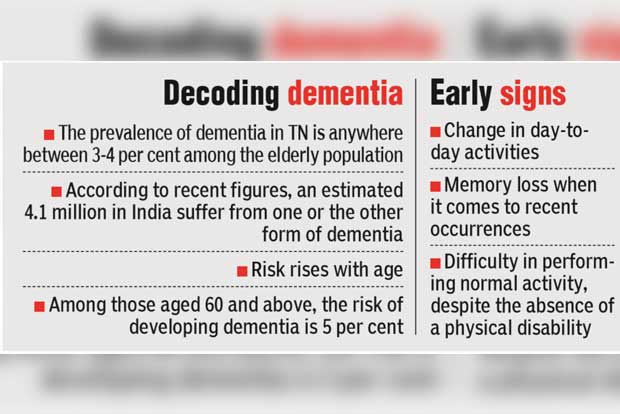Begin typing your search...
As cases of dementia rise in city, experts call for a registry
Due to a steady rise in dementia cases, experts are looking at setting up a registry to keep track of the cases in the city.

Chennai
Recently, Krishna Rao*, a retired professor, went missing after an evening walk near his home in Perungudi. After a few days of search, he was finally found in Guntur, his hometown, without a trace of memory about his trip from Chennai.
Suffering from severe dementia, the septuagenarian is one among the many afflicted by the condition that sets in with old age. On the other hand, SM Venkatesh, a social worker who rescues about 20 elderly people every month from the street, says about 5 to 10 among them have the condition.
Dementia is a general term used to describe a group of illnesses caused by loss of brain function. It usually affects the elderly, but those younger than 65 years, too, can develop dementia, called ‘early onset dementia’.
Dr Sridhar Vaitheswaran, consultant psychiatrist, Dementia Care in SCARF (DEMCARES), said that even
according to cautious estimate, there would be around 30,000 people with the condition in the city.
“Given that the estimate of the numbers in India is likely to go up to 10 million by 2040, Tamil Nadu will have a sizable proportion of the number,” he added. Dr R Sathianathan, professor, Head of the Psychiatry Department at Sri Ramachandra Medical College and vice-chairperson, Alzheimer’s and Related Disorders Society of India (ARDSI), said that they were mulling to set up a registry to keep a track of these case.
“There has been an increase in the number of cases coming up, it is difficult to follow them up, as they either migrate or stop visiting. The registry will help us have a contact with the medical professionals. In Scandinavian countries, such a registry is easy to maintain as the general physicians refer them to specialists. Here, some cases are being followed up by psychiatrists, geriatricians and neurologists. We are looking at the best way to have one.”
Experts also rue the lack of policies and adequate medical professionals to tackle the disease, given the rate of its growth. Dr Sridhar said, “The caregivers often say that they learnt about it from the net but never from the health professionals. We are not equipped to handle the growth.
The National Mental Health Programme does not have specifics for elderly with mental illness including dementia. The ideal scenario would be diagnosing it earlier. It is not about curing, but improving their quality of life. Interventions can delay the progress, provided it is done at the right time.”
D Rajasekaran, general secretary of the Tamil Nadu Senior Citizens Association that reaches out to 1,000 members in the city said the common complaint among members is the lack of adequate doctors to discuss the condition. “We publish articles and resource material to guide them through the condition,” he said.
Visit news.dtnext.in to explore our interactive epaper!
Download the DT Next app for more exciting features!
Click here for iOS
Click here for Android
Next Story



